Your Guide to Social Media Analytics
Social media is one of the most popular ways we connect with other people today. Besides social interactions, these platforms are useful for many things. For example, suppose you are a business owner. Social media analytics allows you to track key metrics and progress. By implementing a well-designed social media strategy, you’ll grow faster than ever. Analytics help you parse through the data. That way, you can develop the best social media strategy to optimize your growth.
Key Topics Covered in This Guide
- What Is Social Media Analytics Meaning
- Types of Analytics Used in Social Media
- What Is Social Media Analytics Definition
- What Does Social Media Analytics Do
What Are Analytics?
First, we must begin by looking at the fundamentals. Before you can use these tools, you must understand what they are. That leads us to a simple question.
What Is Social Media Analytics?:
This is a broad term. It covers a range of tools used to track marketing metrics. For example, you might use them to see how many views your page gets. You could also track customer acquisition rates and more.
Social Media Analytics Meaning:
The meaning of the term is slightly different from the definition. Typically, people use it when talking about any data from their social media. Most of the time, this data is from their customers. Generally, this is used to reformulate your marketing approach.
What Does Social Media Analytics Do?
Of course, the most important thing to know about analytics would be what they can do for you. Unless you utilize them, you won’t benefit. However, with the right application, they can turbocharge your business.
Deepens Your Understanding of Your Audience:
How much do you know about your audience? Without analyzing traffic patterns, it probably is less than you think. If you use analytics tools, you’ll become more aware of trends. These are crucial when redesigning a social media marketing strategy.
Find the Greatest Sources of Traffic:
Where are you getting your traffic from? If you know where most of the people who view your content come from, you can target them. That way, you can enhance the total traffic you receive. For example:
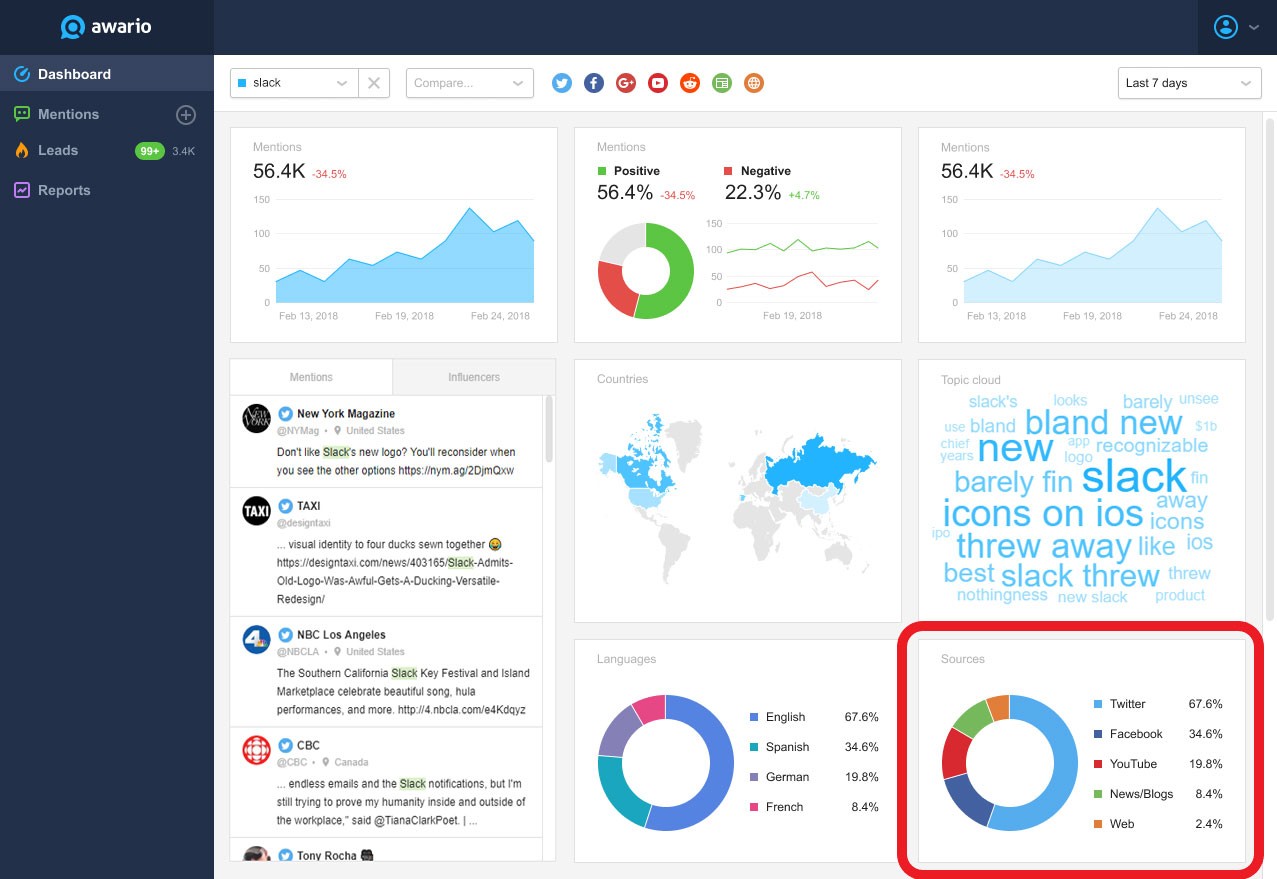
(Image Credit: Social Media Today)
Test your website’s SEO and social media score in 60 seconds!
Diib is one of the best SEO and social media monitoring tools in the world. Diib syncs to Facebook and Google Analytics and uses the power of big data to help you quickly and easily increase your social media traffic and SEO rankings.
- Easy-to-use automated social media + SEO tool
- Keyword and backlink monitoring + ideas
- Speed, security, + Core Vitals tracking
- Automated ideas to improve Social Media traffic + sales
- Over 500,000 global members
- Built-in benchmarking and competitor analysis
Used by over 500k companies and organizations:
Syncs with 
What Is Social Media Analytics Definition?
We can broaden our definition to include a number of tools. Today, there are many applications available for you to use. Each of them gives you more tools to use on your social media page.
Tools to Analyze Internet Traffic:
You Might Also Like
The variety of applications used in analytics is impressive. Years ago, you had to crunch the numbers by hand. Today, you can simply install a widget. Then, you are good to go. We recommend looking at as many different tools as you can. By doing this, you’ll find what works the best for you. Here is just one example of a social media analytic widget:
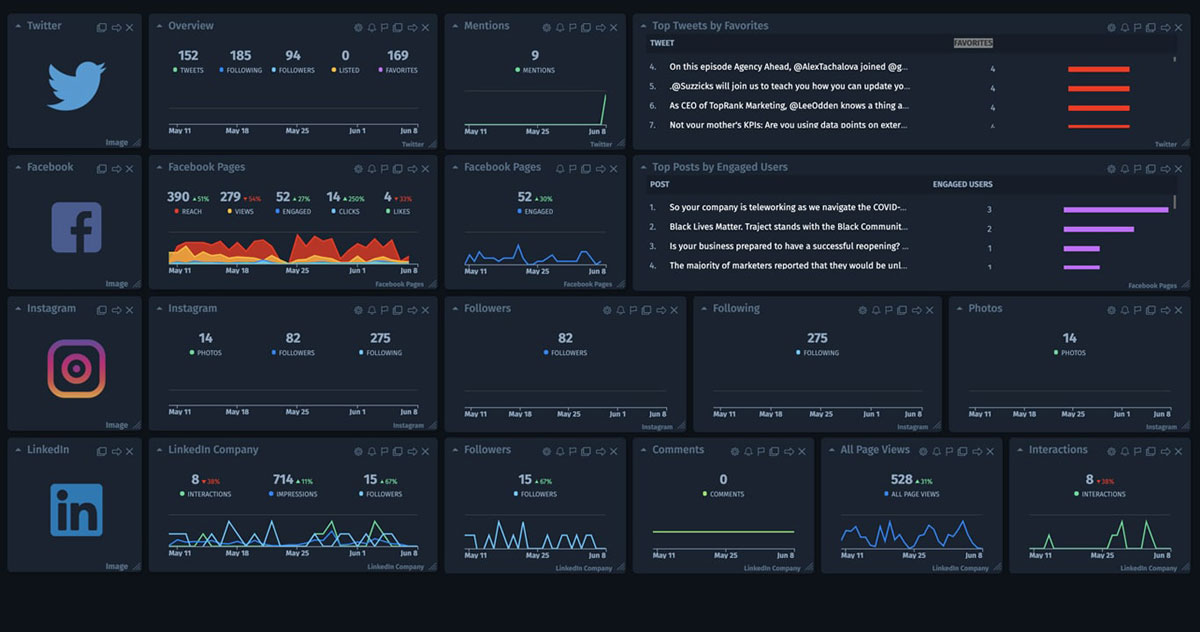
(Image Credit: Cyfe)
Useful for Improving Social-Media Business Strategies:
When you first began to market on social media, how successful were you? Most likely, you had a little more difficult than you would like to admit. This is a common experience. If you want to improve, analytics gives you the necessary tools to proceed.
How Social Media Analytics Can Benefit Your Business
The most important thing to consider would be how your business will benefit. If a tool seems interesting, try it out. However, do not continue to use them unless they provide real results. You can tell when they do by measuring your progress. Here are a few metrics we suggest tracking.
Convert Prospects Into Customers:
How many people who view your page become customers? We all know, not every view turns into a transaction. However, there are often trends you can track. For example, you might find that 1 out of every 1000 views generates a customer.
Save Money on Ineffective Marketing:
Marketing costs money. When you market your social media pages, the goal is clear. You want the money spent on marketing to earn more than it costs. If you find a strategy is a losing investment, change your approach. In this way, you’ll reduce the amount you waste.
Find What Works the Best:
Are you using the most effective approach for your business? There is only one way you can know. By using analytics, you’ll find out whether there is something better you can do.
Analytics Used in Social Media
What different types of data do we have access to when we use analytics? In the modern world, the variety can be staggering. The following are some of the most common you’ll encounter. Each has a specific use. Learning them will be incredibly helpful later on.
Analytics Reports
First, let’s look at the big picture. Regardless of which tools you use, they will provide you with reports. These reports present data in easily understandable ways.
Stats and Data:
Every person who comes to your social media page leaves a trail of data. This data is at the core of analytics. Depending on the program you use, you’ll be given reports based on different data.
Time:
One of the most helpful features of analytics is the way it processes time. Using this, we can see how the decisions we make change things. For example, tracking the time people spend on Facebook allows us to decide when the best time to post is:
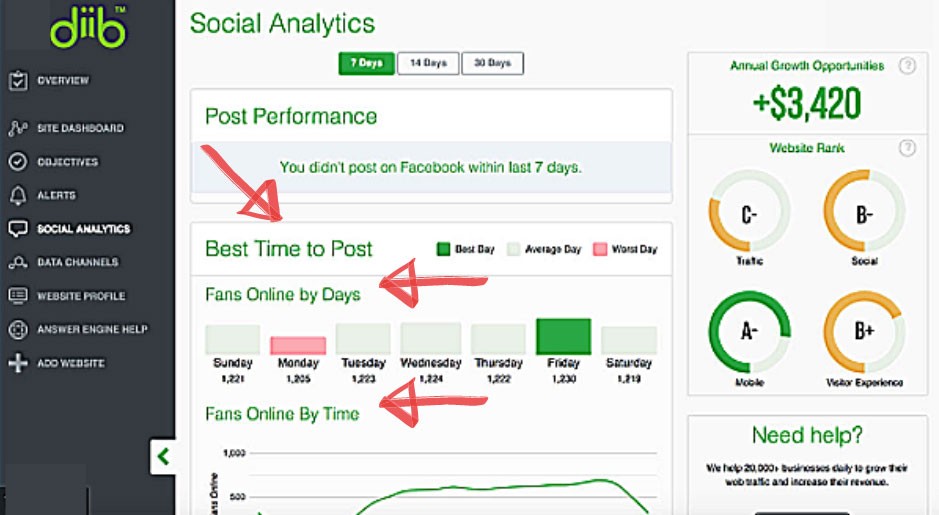
Growth:
Of course, you want to know if your strategy works. The best way to tell is by tracking growth. This is rather simple when we use analytics tools.
Types of Reports
The reports are the most useful part of this you will find. Each report gives us a view of a different metric. By using a variety of these, we can see how our pages are performing.
Views:
First, views are the most understandable metric to track. Simply put, it shows you how many people visit your page. You can look at a specific time frame as well. That way, you can look at how your strategies impact customer traffic.
Posts:
This metric is better for you if you want to track your performance. Many pages have useful information. However, they do not post often enough. If you believe there is an optimal amount of content to create, track it this way.
Clicks:
Clicks are slightly better than a view. These show you that people are more engaged than simply stopping by your page. If people are clicking on your content more, it means they find it more valuable.
Shares:
Shares are the most important metric for you to track. No matter how we market our content, shares are always more effective. Think of it this way. Are you more likely to view something sent by a friend or an algorithm?
Other Interactions:
Every way that people interact with your page can be tracked. For example, you can get a glimpse at the total number of likes your pages receive. That way, you can understand how engaging your content is. The more interactions you receive, the more engaging your content is. The image below shows an example of all of the previously mentioned categories:
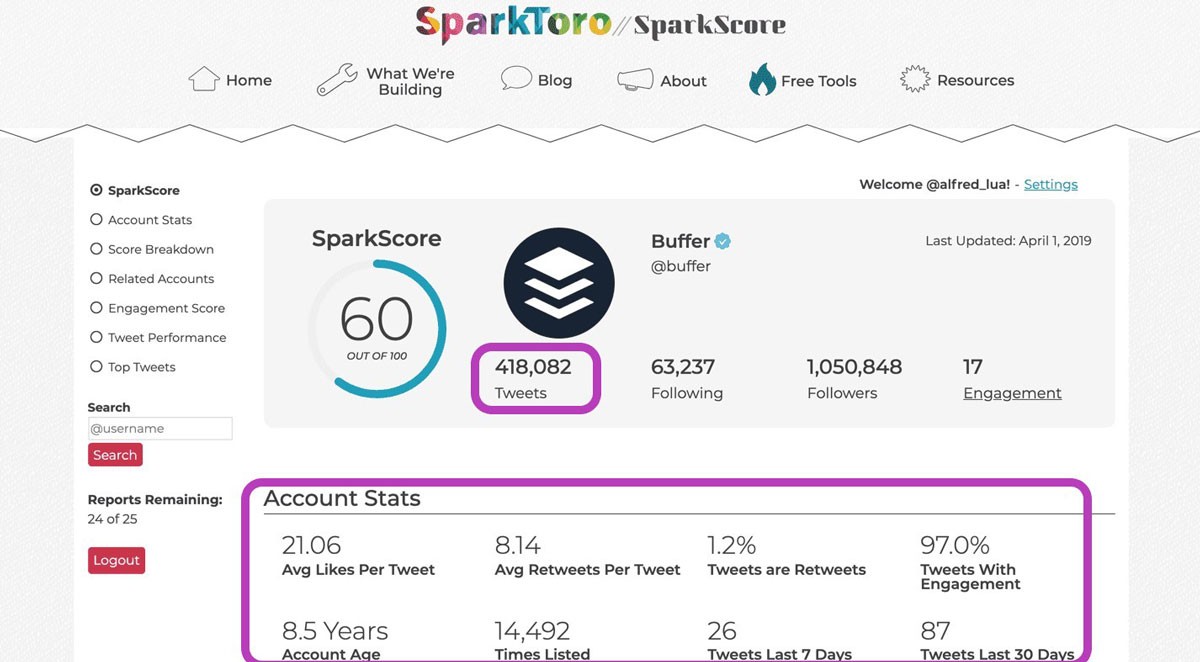
(Image Credit: Buffer)
We hope that you found this article useful.
If you want to know more interesting about your site health, get personal recommendations and alerts, scan your website by Diib. It only takes 60 seconds.
How to Get the Most Out of These Reports?
Ok, so you know how to track data using analytics now. What should your next move be? In our opinion, the only way to get the most of it is by setting goals. Not any goal will suffice, though. They must be achievable and realistic.
Goal Setting:
Goals are the best way for you to move forward with your business. Otherwise, you will wander aimlessly. On the other hand, creating effective goals helps motivate you. Plus, it gives you a direction to head in.
Be Specific:
Perhaps, the most important aspect of a goal is its specificity. Unless goals are specific, we won’t try to achieve them. Instead, we will waste time. Always set goals with specific metrics in mind. For example, try seeing if you can increase total traffic by 15% this month.
Make Them Attainable:
Goals should also be realistic. There’s nothing wrong with setting ambitious goals. However, unless you believe you can achieve them, they will be counterproductive.
Ensure You Measure Progress:
As you work on your goals, keep an eye on your metrics. Sometimes, you might need to change how you approach things. Suppose you see your metrics slipping. You need to reevaluate your strategy. If you don’t, you are shooting yourself in the foot.
Different Metrics You Can Track Using Analytics
Each metric provides you with additional insight. The more metrics you track, the greater your understanding of your audience. Here are a few of our favorite metrics. By using them, you’ll further develop your social media business.
Your Audience
The most important consideration when running a social media business is your audience. Without them, you won’t find much success.
How Many People Have Seen Your Content?:
The most direct way to view the size of your audience would be by looking at your total page views. This tells us how many people have seen your page recently. You can change the time frame you look at. That way, you can see how pages perform within a specific window.
How Many New Viewers Are You Attracting?:
We can divide the traffic to get a deeper analysis. For example, you can track how many first-time visitors you get. This is a useful stat to look at how fast your business is growing. The more new viewers you get, the faster your business will grow.
Are Previous Viewers Returning?:
Finally, we can also look at your retention rates. When you post new content, do previous viewers return? If they do not, it will be more difficult to expand. For example:
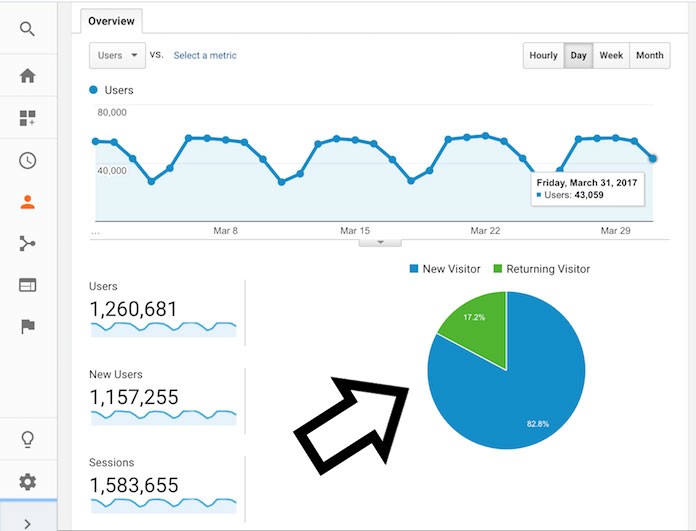
(Image Credit: Crazy Egg)
Audience Engagement Level
Besides your total traffic, we can also look at the total engagement. An engaged audience is better than a passive one. When your viewers engage with content, they are more likely to generate revenue for you.
How Many Shares Are You Getting?:
Shares are the best way to grow your audience. When people share things with their friends, it does not cost you anything. Plus, social media users are much more likely to view content sent to them by people they know.
How Many Times Have People Liked Your Content?:
Likes are not as powerful as shares, but they are still useful. Suppose you were someone who has never seen your content before. Would you be more likely to check it out if it had a ton of likes or very few?
Are People Leaving Comments?:
Conversations are great. Even if people are not buying, comments mean they took time out of their days to put their thoughts on paper.
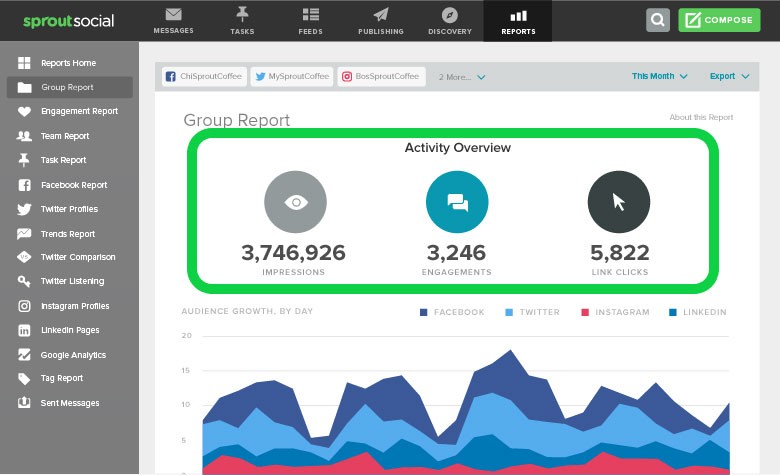
(Image Credit: Anthony Lewis)
Analytics Return on Investment
Your return on investment is something all business owners should track. By looking at it, you’ll see how effective your approach is. If you spend more on marketing than you get in revenue, you should switch perspectives. That would mean something is not working right.
Growth or Contraction in Sales?:
Since you started using analytics, have you gotten more or fewer sales? If you want to grow your business, you should always be looking to grow.
Increase or Decrease in Customer Loyalty:
Are you receiving sales from previous customers? If so, your customer retention is good. In that case, you might want to focus on attracting new customers. On the other hand, if it is decreasing, your focus should be on retaining customers.
Better or Worse Brand Awareness:
People need to know about your brand before they consider buying it. Very few of us will buy something without any familiarity. Even if we do not buy something the first time we see it, we will be more likely to make a future purchase.
Capitalizing on the Power of Analytics for Your Business
Now, how can you put all of this together? Depending on what you want to achieve, you might want to go about things in different ways. However, in general, the following sequence will suffice.
Tracking Your Goals
After you decide what your goals should be, you can start to work on them. As we mentioned previously, tracking your progress is essential. If you neglect to do so, you’ll have no way to measure your progress.
Give Yourself Enough Time:
We recommend setting deadlines on all of your goals. Deadlines make us more likely to follow through on them. However, you need to ensure you make them large enough. If you don’t, you’ll frustrate your attempts.
Constantly Monitor Your Reports:
We suggest tracking your metrics daily. That way, you always know how things are moving along. If things look good, you can continue as you were. However, if trends reverse, you’ll know right away.
Adjusting Your Approach
In the event your progress slows, you can change how you market your page. By doing this, you’ll constantly innovate. Innovation is the engine of growth when it comes to social media. People have different opinions. Plus, what people like to see changes over time.
Change One Variable at a Time:
If you want to take a methodical approach, change a single variable at a time. That way, you can isolate the effects of each one. It may take a little longer. Nevertheless, it will be more than worth it.
Consider Innovative Solutions:
Sometimes, you can simply take an approach from someone else. It may be effective for your page. However, doing things differently could produce even better results. Don’t be afraid of trying something totally new. In some instances, these are the best approaches you can take.
Experimenting With Various Tools
If you are interested in using analytics, you need to find your tools. Considering the wide variety available, the best options will differ by the person. We recommend researching a few different options to see what stands out.
Google:
Google is a great resource. Most internet traffic runs through their servers. By using the tools provided by Google, you gain deep insight into the performance of your pages. For example:
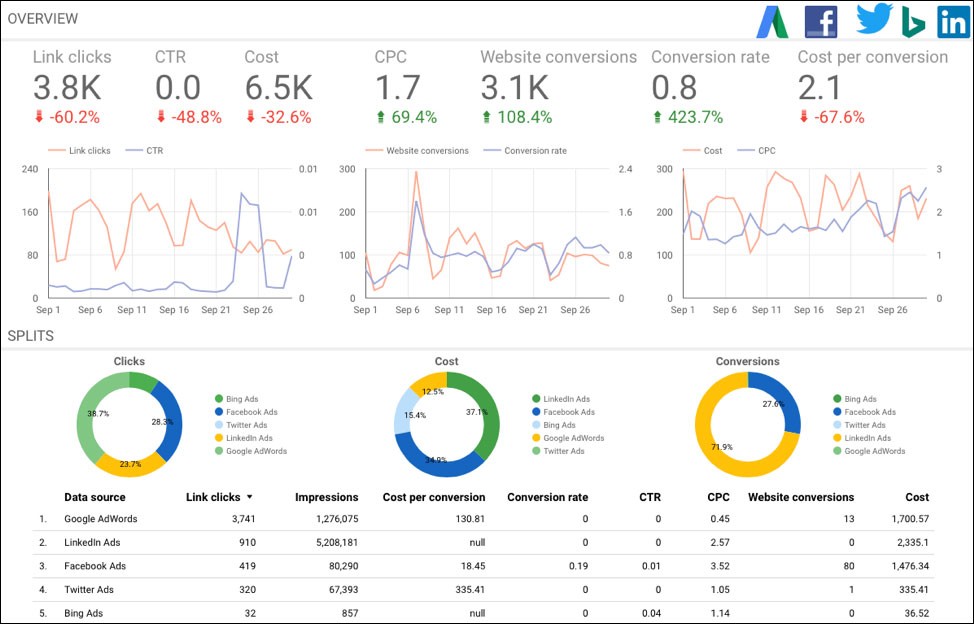
(Image Credit: Sprout Social)
Hubspot:
Hubspot is a popular platform where people post blog content. Much of its content is made to use analytics. Check out their page to view all the tools that have at your disposal. For instance:
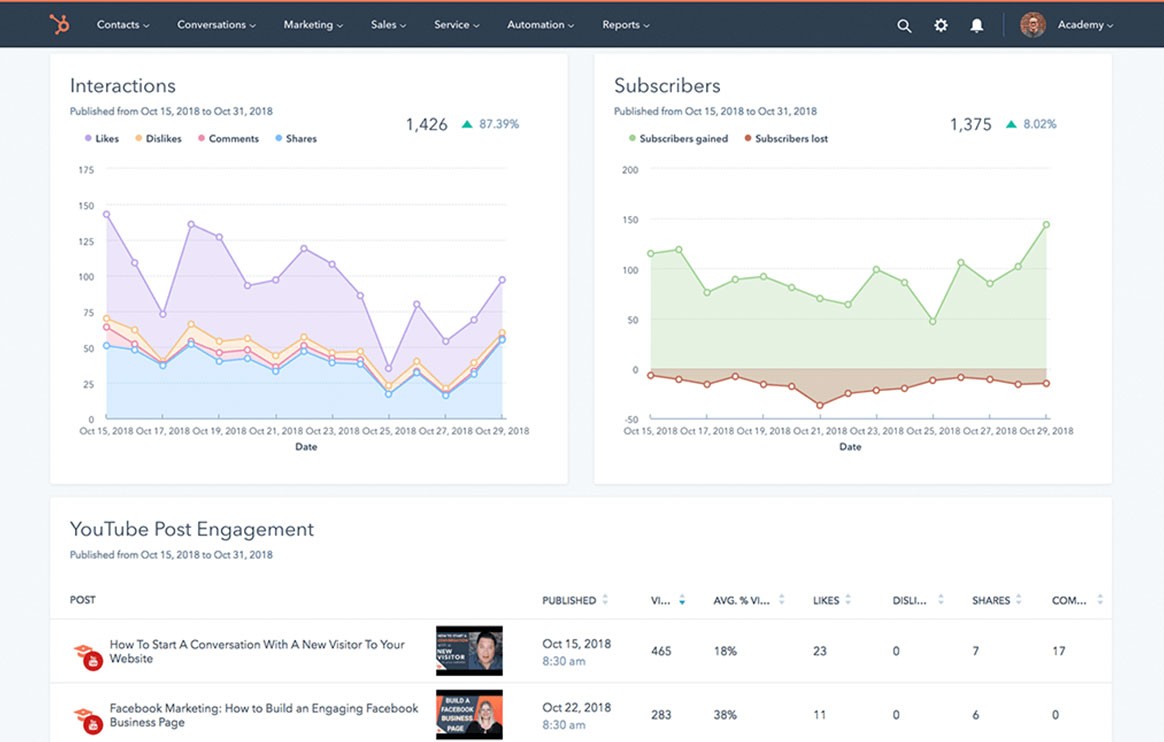
(Image Credit: HubSpot)
What Is Social Media Analytics
Analytics is a powerful set of tools we can use to track the performance of our web pages. In the case of social media, it helps us to track how engaged our audience is. By using this, we can cultivate a better appreciation for how we create content. If you want to expand your business, these tools will be invaluable. Without them, you will be at a disadvantage. If others are using these tools, you should too. That way, you are on a level playing field.



